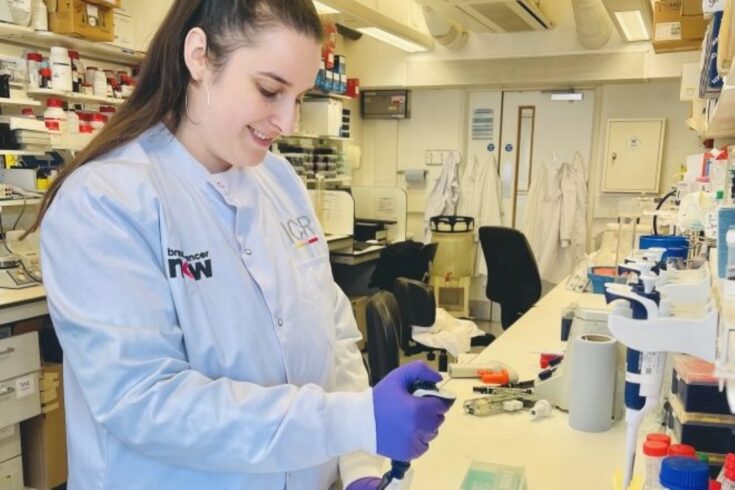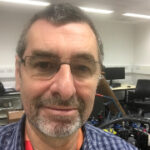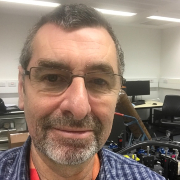In 2021 the ‘Oscars for technicians’ were born to increase the visibility and recognition of technical staff. The Research Institute Technician Awards, or the pithier ‘RITAs’, recognise the achievements of technicians and technical experts working in nine institutes across the UK. These institutes have signed up to the Technician Commitment, which aims to recognise the work of technicians and support their career development.
A sponsor of this years’ awards, UK Research and Innovation (UKRI) has just launched an action plan which builds on the UKRI Technician Commitment. This aims to support people and teams to pursue ideas and make connections across disciplines. Here we meet Derek and Rebecca, two of the Medical Research Council (MRC) award winners.
Derek Davies, Science Technology Platform Training Lead at the Francis Crick Institute in London
Lifetime Achievement award for: being an educator, professional scientist, leader and influencer in UK Flow Cytometry

Credit: Derek Davies
What does it mean to you to receive the award?
I was very honoured to receive this award. I think it recognises the key contributions that I have made to training the next generation of flow cytometrists over my 40 years in the field. Flow cytometry allows us to identify individual cells as they pass through laser beams; it has been a key technology in explaining the complexity of the immune system.
Why does your work matter?
All technology relies on the thorough understanding of both theory and practice. If researchers understand these principles they are better able to design, run and analyse experiments. This reduces the time to results and makes those results more robust and reliable.
After heading up the Flow Cytometry Science Technology Platform at the Francis Crick Institute for four years, in 2019 I moved to my current role. This is dedicated to developing external training in all our core technologies. This draws upon many of the skills that I’ve developed over my career. I support biomedical science outside the Crick building, using the expertise that we have in training in specific technologies, including live in-person meetings, virtual courses and self-paced eLearning.
What’s the highlight of your job?
The fact that every day is different and that I get to deal with a wide variety of people and research projects. I’m also proud that very many of my previous staff have gone on to run their own facilities not just in the UK but around the world.
Any career advice for other technical specialists or technicians?
Never say no, at least not initially as you never know where opportunities may arise. Also, in any technology field we have to embrace change, understand the advantages that that change brings and translate that to users of that technology. And enjoy every day!
Rebecca Orha, Higher Scientific Officer at the Institute of Cancer Research in London
Rising Star award for: her dedication, integrity, lab management responsibilities and training of new members

Credit: Rebecca Orha
What does it mean to you to receive the award?
I am very proud of receiving this award as it recognises my scientific and personal progress over the past six years. And I am honoured that my nominators wanted to put me forward. It has also meant a great deal to my family in Romania who have supported me from afar.
Why does your work matter?
For the past couple of years, I have worked on a project that’s recently been published in Nature Cancer. The publication is looking at why oestrogen-receptor-positive breast cancer cells spread to other organs in the late stages of breast cancer, as well as at ways we can prevent this. About 75% of breast cancers are oestrogen receptor positive.
I’m also designing and performing experiments with genetically modified chimeric antigen receptor (CAR) T-cells. These cells have been edited using gene therapy to allow them to hunt down different cell types that support the growth of cancerous cells. By assessing how well they target tumours in mice, I hope to help move this project towards the clinic and patient benefit.
What’s the highlight of your job?
Working as part of a team tackling some of the important issues in breast cancer research and providing technical guidance and advice to new members of the laboratory.
Any career advice for other technical specialists or technicians?
My advice is always to be proactive in looking for opportunities to develop. Keep your eyes open for appropriate training courses and seminars relevant to your work. And take the initiative in suggesting new techniques and technologies that can be implemented in your lab.
Find out more
Research England have recently funded an Institute for Technical Skills and Strategy.
Read about recent research using CAR T-cells that led to the world-first use of base-edited cells to treat ‘incurable’ leukaemia.
Top image: Rebecca at work in the lab at the Institute of Cancer Research. Credit: Rebecca Orha






